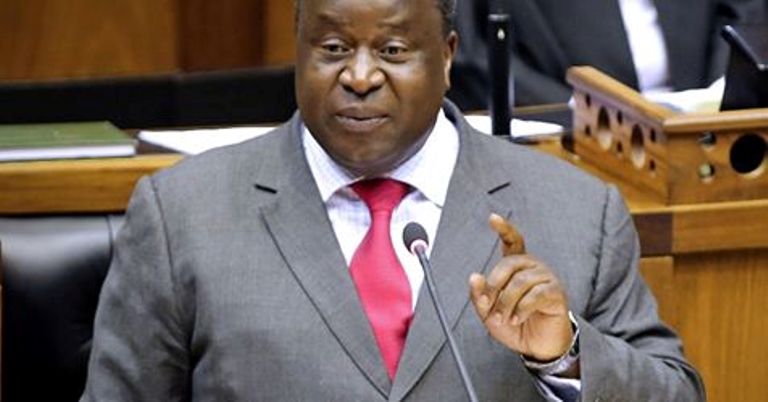
Budget 2020: Mboweni’s Tough Juggling Act
A raft of tax increases and curtailing the public sector wage bill are just some of the interventions anticipated to be announced by Finance Minister Tito Mboweni when he delivers the 2020 Budget. Amid South Africa’s precarious economic state, economists, in anticipation of the Budget, say Mboweni has the unenviable task of extricating the country […]

A raft of tax increases and curtailing the public sector wage bill are just some of the interventions anticipated to be announced by Finance Minister Tito Mboweni when he delivers the 2020 Budget.

Amid South Africa’s precarious economic state, economists, in anticipation of the Budget, say Mboweni has the unenviable task of extricating the country from its dire economic straits.
Consumers, the economists say, should brace themselves for extra tax on personal and company income taxes, while a VAT hike could possibly be on the cards.
In what he describes as a “do or die” 2020/21 Budget, Old Mutual Investment Group Chief Economist Johann Els said: “While VAT was increased to 15% in February 2018 and was then left untouched last year, another VAT rate increase cannot be ruled out in the face of mounting pressure to address widening deficits and climbing debt-to-GDP ratio.”
Hugo Pienaar, from the Bureau for Economic Research (BER), said while a VAT increase was unlikely, it was not beyond the realm of possibility.
“Treasury has not been able to rein in the budget deficits over the last few years, so it is really now or never. We are on the verge of a Moody’s rating downgrade, and if we don’t stabilise the deficit and get spending under control, they will downgrade us,” said Els.
Els said the country needs an annual economic growth of 2.5% – 3% to stabilise the debt-to-GDP ratio and prevent a debt trap.
“We pay more than R200 billion a year on interest payments alone, which is more than the annual budgets of health, education and police services,” he said.
While there will be an attempt to reduce additional spending, cutting back on the wage bill would be advantageous; however, this is not likely, Els said.
“This will be difficult to pull off politically and would need to be negotiated with unions but potentially, it could be a big game-changer. Just limiting wage bill growth to 4% could save R100 billion. While the intention in the Budget must be on the spending side, I am doubtful that the Finance Minister will be able to do enough,” said Els.
Pienaar concurred: “[There will be] an increased tax burden. The question is always: where exactly will this come from?
“I think it’s pretty clear that if you are a smoker or a drinker, you’ll pay more for that. We’ll pay more for petrol, with the fuel levy likely to go up. In terms of the personal tax, we don’t expect the marginal rates to increase. We think the tax bracket will not be fully adjusted.”
Critically, Pienaar said, it will be interesting to see how government’s expenditure will be distributed.
“That’s a little bit unclear but we know there will need to be expenditure cuts. The State of the Nation Address has already indicated that there would be. The key questions is, where will that be effected on? As we’ve seen over the past couple of years on capital expenditure and on goods and services or will be it more focused on the public sector wages? Private sector economists would suggest that [cuts] would need to be on the wage bill,” he said.
However, he said, there was doubt that this would be effected.
Pienaar said he was not expecting drastic interventions in the country’s beleaguered State-owned enterprises (SOEs).
“In terms of Eskom, I don’t think we’ll have in budget bailouts like we did last year. I think there may be bailouts for Eskom in the offing later, especially if Eskom loses its appeal against NERSA [National Energy Regulator],” he said.
Els said consumers need to brace for potential additional taxes on top of the usual suspects, such as no relief for fiscal drag, and extra sin and fuel levy taxes.
“A transition levy, like we had in the mid-90s – which is an extra levy on income tax for individuals and companies – could also be on the cards.
“[W] expect government to look for any possible means to increase revenue, but it is a very tough balancing act, and this Budget is definitely going to be one of the toughest yet in democratic South Africa. However, we’re out of time – some critical decisions will need to be made,” said Els.
In a statement, Business Unity South Africa (BUSA) said the 2020 Budget constitutes arguably the final opportunity for government to demonstrate its commitment and capacity to implement necessary reforms to place South Africa’s public finances on a sustainable trajectory.
“This requires limiting, and over time, reducing public debt levels through efficient prioritising of spending and expanding the tax net through inclusive economic growth,” read the statement.
BUSA said this requires urgent and decisive action by Treasury, with the full and unequivocal support of Cabinet and government more broadly. \
Source: SAnews.gov.za
